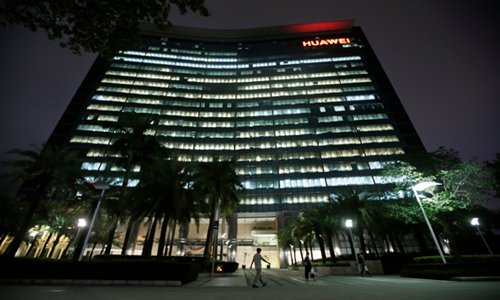HOME >> BUSINESS
Huawei accuses US govt ‘using every tool’ to disrupt firm’s business
By Xie Jun and Li Xuanmin Source:Global Times Published: 2019/9/3 20:33:40
US ‘is using every tool’ to disrupt firm’s business

Employees walk past a research and development building with lights on at 22:04 pm in Huawei's headquarters in Shenzhen, South China's Guangdong Province in May. Photo: VCG
Huawei has rebutted allegations of its smartphone-camera patent theft, providing detailed documents in support of its stance while criticizing the US government to use its political and law enforcement means to disturb Huawei's business.
It also stressed that the US government has been "using every tool at its disposal" to disrupt Huawei's business operations, using extreme measures such as sending agents to the homes of Huawei employees, pressuring them to collect information on the company to turn against the Chinese technology giant.
"We strongly condemn the malign, concerted effort by the US government to discredit Huawei and curb its leadership position in the industry... no company becomes a global leader in its field through theft," Huawei said.
The Chinese mobile phone company offered its explanations after the Wall Street Journal reported that US investigators are digging into new allegations against Huawei. In particular, US officials are looking into whether Huawei stole smartphone-camera technology from a Portuguese investor named Rui Oliveira.
Oliveria claimed that Huawei stole his patented idea for an attachable smartphone camera in an interview in March. Huawei has filed a lawsuit against Oliveira.
Huawei said that it had never used Oliveira's camera design, although representatives from Huawei's US subsidiary met with Oliveira on his request in May 2014, at which time he pitched his camera design to Huawei. Huawei also made clear that its EnVizion 360 panoramic camera was independently designed by its own employees, and that its design was very different from Oliveira's.
"It's clear that Mr. Oliveira is taking advantage of the current geopolitical situation. He is pushing a false narrative through the media in an attempt to capitalize on a dispute. This type of behavior should not be encouraged, nor should it be considered rational justification for a criminal investigation by the US Department of Justice," read Huawei's statement.
Veteran technology expert Xiang Ligang said that Huawei has fought back against a specific accusation with explicit explanations, not only with the hope of gaining a competitive edge in the lawsuit, but also to ensure a correct understanding of the matter after public impressions of Huawei have been distorted by US allegations.
"A frequent allegation made by the US against China in the trade war is theft of intellectual property rights (IPR). This is leading to a misunderstanding in overseas public opinion that China has achieved scientific and technological development by stealing IPR," Xiang said.
According to Xiang, to rectify such misunderstandings, Chinese companies should stand up and fight back on each specific case.
"It would be more convincing if companies could explain each specific case than just generally blaming the US for slandering Chinese companies," he said.
Li Yi, a senior research fellow at the Internet Research Center of the Shanghai Academy of Social Sciences, said that as a technology company, Huawei must feel very angry about such unfair treatment for a long time as being accused of stealing IPR.
"Therefore it clarifies the background details in case some overseas media embroiders the truth," he said, adding that Huawei wants to dispel the doubts of some of its partners.
Huawei also said that the US has been using its political and even law enforcement means to attack Huawei.
Huawei made a detailed list of what the US government has done to disturb the business of Huawei and its partners, including instructing law enforcement to threaten and incite Huawei employees to turn against the company and work for them, unlawfully searching, detaining and even arresting Huawei employees and partners, as well as sending FBI agents to the homes of Huawei employees and pressuring them to collect information on the company. But the company did not reveal details.
The US government also launched cyber attacks to infiltrate Huawei's intranet and internal information systems, the statement read.
Xiang said that the US would try various means to thwart China's technology development. "To cope with such a situation, China should first attend to its own missions and then fight back according to the facts," he said.
"I think the fact that Huawei lashes out against US misdeed in such an intense manner signifies that it is ready to give up US suppliers and that it is confident of withstanding US attacks with its own high-tech innovations," Li said.
Newspaper headline: Huawei rebuts patent theft claims